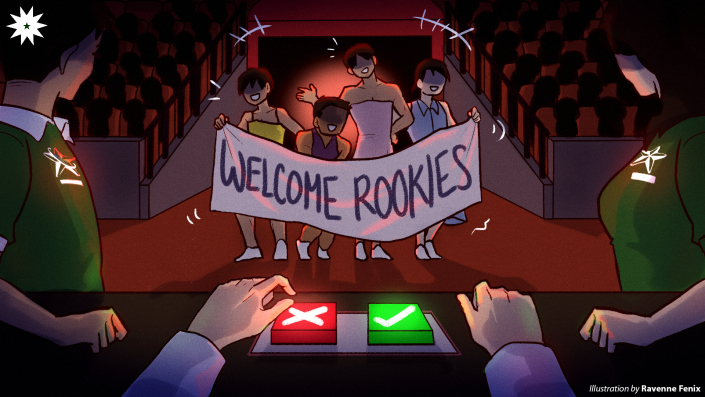Filipinos have been known to be unkind toward the members of the LGBTQ+ community. From disgusted stares, ridicule, to outright violence, the LGBTQ+ community knows how difficult it is to be true to oneself in the country they call home. Despite this, the University prides itself in its supposed progressiveness and claims to be a safe haven for everyone. But how can it continue to call itself “progressive” and establish “safe spaces” when homophobia is perpetuated in the guise of “tradition?”
Perpetuating homophobia
Although what transpired during the Animo Rally did not necessarily voice out homophobic and transphobic remarks, it is clear as day that one’s gender identity and expression were made a laughingstock in a university that claims to be one of the most progressive in the country.

In a time and age where we try our best to offer spaces for everyone to be comfortable expressing who they are, performing in front of the whole University crossdressed—even if it is not their gender expression—with wide smiles and loud laughter is a testament of how we are a long way from being “progressive”.
It is not only the University and Lasallian student-athletes who are to be blamed for creating such an unsafe space. Students who found the act amusing can be blamed as well. Yet, finding amusement in such acts is something that is already ingrained in Filipino culture; subjecting LGBTQ+ members to jokes, calling them names, and harassing queer children to “make them straight” have apparently been normalized. And with the act being a Lasallian pep rally tradition, one ought to ask: should all ingrained traditions still live to this day?
Action, not posts
Statements of disappointment and condemnation can only do so much. As of press time, no mention of any concrete actions toward preventing another similar incident was made by the University Student Government (USG), even if the USG Commission on Gender Equality and Task Force DIVERSE exist.
Yes, statements coming from outgoing USG President Giorgina Escoto and Commissioner on Gender Equality Moi Pulumbarit have reminded the community that the Safe Spaces Act exists. However, one essential message was lacking from both statements—a call for the abolishment of Lasallian varsity teams’ tradition of letting their rookies crossdress during the pep rally for everyone’s amusement.
Meanwhile, DLSU’s PRISM was slow on the uptake of the matter. Being the main organization in the University that represents the LGBTQ+ community, why did they take a long time to issue a statement when their constituents have already voiced out their discomfort? External organizations were faster to call out the University on the issue than the supposed representatives of the LGBTQ+ community inside the University.
Lacking consequences
The Safe Spaces Policy became effective in the University back in November 2020, in accordance with Republic Act 11313 or the Safe Spaces Act. It says in its policy statement that it provides for a University that “fights all forms of sexual harassment” and “promotes a harassment- and violence-free environment.”
Yet, the student-athletes responsible are not facing consequences of any sort for crossdressing in the pep rally. No directives to change the tradition were given. It is as if the Safe Spaces Policy does not exist in the University.
Other people might argue that what happened during the pep rally does not necessarily count as harassment, at least in the legal sense. After all, the athletes have not voiced any disdain toward the LGBTQ+ community, and the act was not sexual. This is true at some point and crossdressing lies in a gray area when it comes to unsafe spaces. Dictionary and legal definitions of what classifies as “offensive remarks” and “sexual harassment” do not cover what has transpired.
However, many have rebuked the act. To the public, the act was offensive. To the student body, the act was insulting. To the LGBTQ+ community, the act was an erasure of their struggles for an equal and safe DLSU.
With reactions of the same nature, it is high time for the University to revisit the policy’s provisions. After all, it has committed itself to “periodically audit policies, guidelines, structures, and mechanisms to support gender equality and safe spaces.” Given that students have already voiced their discomfort regarding the incident, the ball is now in the University’s—the USG’s and the administration’s—court. Will the University be a hypocrite and continue this hurtful tradition, or will they finally reconsider certain traditions for a safer and more inclusive DLSU?
